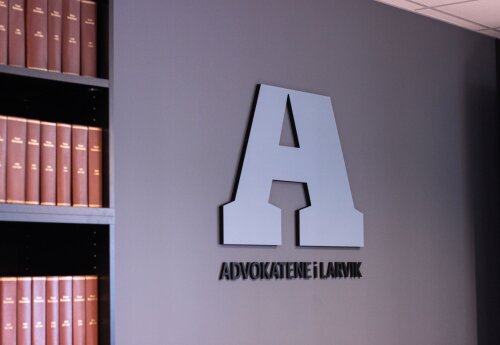Best Employment & Labor Lawyers in Norway
Share your needs with us, get contacted by law firms.
Free. Takes 2 min.
Or refine your search by selecting a city:
List of the best lawyers in Norway
About Employment & Labor Law in Norway
Employment and Labor law in Norway is largely influenced by a strong tradition of labor protection, influenced by both domestic legislation and international conventions. Norway has a high degree of unionization, and collective agreements play a crucial role in the workplace. The main legal framework governing employment includes laws on working conditions, employee rights, hiring and termination processes, and workplace safety standards. The Working Environment Act (Arbeidsmiljøloven) remains central, promoting safe and fair working conditions and balancing employer interests with employee rights.
Why You May Need a Lawyer
There are numerous situations where individuals or employers might seek legal assistance within the realm of Employment and Labor law in Norway. Common scenarios include:
- Disputes over employment contracts, including terms of employment, and breaches.
- Issues concerning unfair dismissal or wrongful termination claims.
- Matters involving discrimination, harassment, or workplace bullying.
- Negotiating severance packages or redundancy settlements.
- Situations involving worker's compensation or occupational injuries.
- Interpretation and enforcement of collective bargaining agreements.
- Navigating compliance with workplace safety and health regulations.
- Assistance with employee benefits, pensions, and leave entitlements.
- Guidance through restructuring or downsizing processes.
Legal expertise can help in understanding complex legislations, drafting documents, negotiating disputes amicably, and representing interests effectively in court if necessary.
Local Laws Overview
Norwegian employment law is comprehensive and covers various areas significant for both employees and employers. Here are some key aspects:
- The Working Environment Act: This is the principal law that regulates working hours, safety, health, and well-being of employees. It sets limits on work hours and ensures that environments are neither physically nor psychologically hazardous.
- Employment Contracts: In Norway, all employees are entitled to a written contract of employment containing specific terms and conditions. The law mandates many elements that should be included in these contracts.
- Equality and Anti-Discrimination: The Equality and Anti-Discrimination Act prohibits discrimination based on gender, ethnicity, religion, disability, sexual orientation, and other factors. It promotes equal treatment and non-discrimination in the workplace.
- Parental Leave and Benefits: Norway offers generous parental leave policies. Parents can share up to 49 weeks of paid leave, and there are additional unpaid leave rights for child care.
- Termination of Employment: There are detailed regulations on termination processes, requiring justified reasons and proper procedures to be followed. Employees also have a right to a notice period and in some cases, severance pay.
- Collective Agreements: Many industries are governed by collective agreements that often provide better terms than statutory minimums regarding pay, working hours, etc.
Frequently Asked Questions
What are the standard working hours in Norway?
Standard working hours in Norway are typically 37.5 hours per week. The maximum working hours are regulated by law to ensure safe and healthy working conditions.
What rights do employees have regarding vacation leave?
Employees are entitled to a minimum of 25 working days of vacation per year. This can be more generous under collective agreements or by individual employer policies.
Can my employer change the terms of my employment contract unilaterally?
No, significant changes to employment terms typically require consent from the employee or a renegotiation process, often involving the union if applicable.
What should I do if I face discrimination at work?
If you experience discrimination, you should document the instances and report them to your employer. Legal action can be pursued if the issue is not resolved internally, and you may also contact the Equality and Anti-Discrimination Ombud for support.
What is the process for raising a claim for unfair dismissal?
Unfair dismissal claims typically involve a negotiation period, mediation, or court proceedings. Legal advice should be sought, as these matters can be complex.
Are temporary workers protected under Norwegian law?
Yes, temporary workers have several protections under Norwegian law, including the right to a written contract and adherence to standards similar to permanent employees.
What is a collective agreement and how does it affect me?
A collective agreement is a contract between unions and employers that stipulates wages, working conditions, benefits, etc. Employees under such agreements often enjoy better conditions than statutory minimums.
How does the probationary period work in Norway?
A probationary period can be up to six months, during which an employment relationship can be terminated with two weeks' notice if the dismissal is objectively justified.
What is the role of the Labor Inspection Authority?
The Labor Inspection Authority oversees compliance with the Working Environment Act and ensures that workplaces adhere to safety and health regulations.
Can I work part-time while on parental leave?
Yes, the Norwegian parental benefit system is flexible and allows part-time work in combination with leave, subject to agreement with your employer.
Additional Resources
The following resources can provide further information or assistance:
- The Norwegian Labor Inspection Authority (Arbeidstilsynet): Offers guidance and oversight for workplace regulations.
- The Equality and Anti-Discrimination Ombud (Likestillings- og diskrimineringsombudet): Provides support and advice on discrimination issues.
- Labor Unions: Unions such as LO (Landsorganisasjonen i Norge) offer support and representation for workers.
- Legal Aid Centres: Offer advice and representation, sometimes for free or at reduced rates for those who qualify.
- HMS Norge: Provides guidance on health, safety, and environment aspects at work.
Next Steps
If you seek legal assistance in Employment & Labor matters, consider the following steps:
- Identify your specific legal issue and gather all relevant documents and evidence.
- Research potential lawyers or legal firms specializing in Employment & Labor law in Norway.
- Consult with a lawyer to discuss your case and understand your rights and options.
- Consider joining a labor union for additional support and resources.
- Follow the lawyer’s guidance on proceeding with negotiations, dispute resolution, or court proceedings if necessary.
Early legal advice can be crucial in resolving or even preventing disputes, so do not hesitate to seek professional help when needed.
Lawzana helps you find the best lawyers and law firms in Norway through a curated and pre-screened list of qualified legal professionals. Our platform offers rankings and detailed profiles of attorneys and law firms, allowing you to compare based on practice areas, including Employment & Labor, experience, and client feedback.
Each profile includes a description of the firm's areas of practice, client reviews, team members and partners, year of establishment, spoken languages, office locations, contact information, social media presence, and any published articles or resources. Most firms on our platform speak English and are experienced in both local and international legal matters.
Get a quote from top-rated law firms in Norway — quickly, securely, and without unnecessary hassle.
Disclaimer:
The information provided on this page is for general informational purposes only and does not constitute legal advice. While we strive to ensure the accuracy and relevance of the content, legal information may change over time, and interpretations of the law can vary. You should always consult with a qualified legal professional for advice specific to your situation.
We disclaim all liability for actions taken or not taken based on the content of this page. If you believe any information is incorrect or outdated, please contact us, and we will review and update it where appropriate.
Browse employment & labor law firms by service in Norway
Norway Attorneys in related practice areas.
Browse employment & labor law firms by city in Norway
Refine your search by selecting a city.















